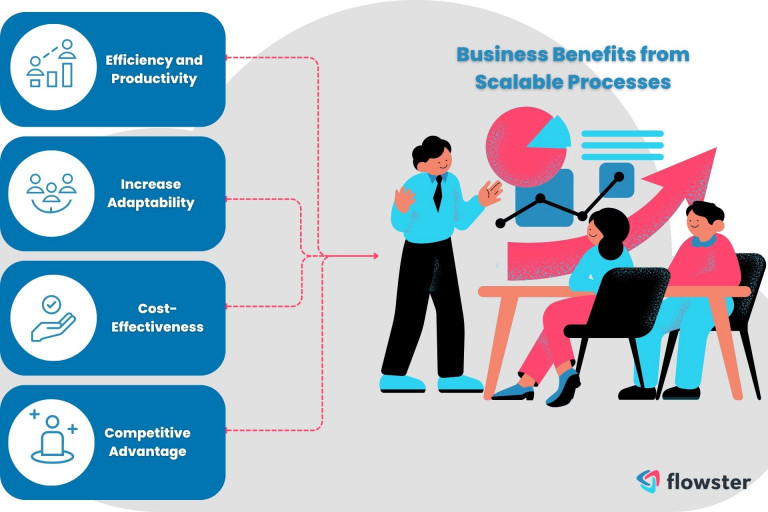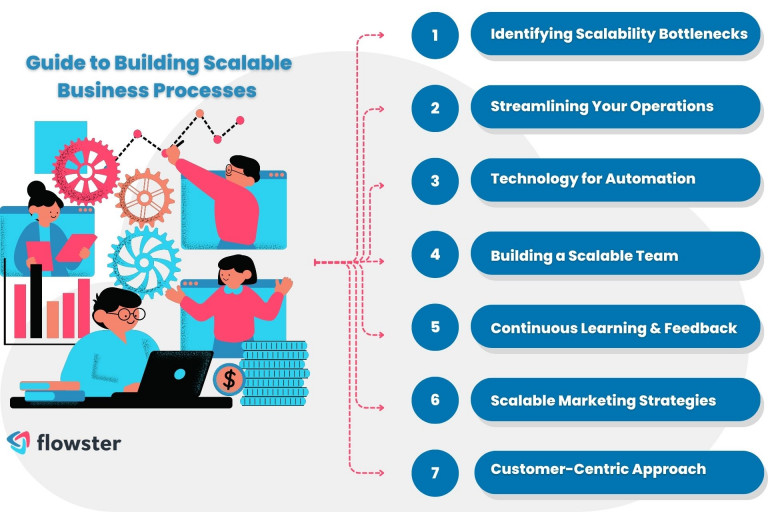In the fast-paced business landscape of the 21st century, scalability has become a key driver for success. For any organization looking to grow sustainably and maintain a competitive edge, implementing scalable processes is of paramount importance.
Having a scalable business model empowers businesses to handle increased demands, expand their operations, and adapt to changing market conditions seamlessly.
In this article, we will delve into the concept of scalable processes, explore their significance, and provide actionable insights to unlock your business’s growth potential. Let us dive in right now!
Article Outline
Scalable Process: An Overview
Scalable processes refer to a set of procedures, systems, or methods that can accommodate a growing volume of work to achieve a desired outcome without compromising efficiency or quality. They allow businesses to handle increased production, service, or demand without requiring a proportional increase in resources.
Scalable operations are the backbone of successful scaling strategies and are crucial for organizations aiming to achieve long-term success. When your business processes are scalable, you set a solid foundation to accommodate increased demand, higher workloads, and expanding markets.
This agility enables you to seize opportunities quickly and efficiently, giving you a competitive edge over others in your industry. In simpler terms, scalable processes allow businesses to handle more work, customers, or demand without needing to significantly increase their resources or production costs as the business grows.
The Significance of Scalable Business Processes
Before we get started with implementation, let’s first delve deeper into the concept of operational scalability and explore what makes it essential for businesses aiming to achieve sustainable growth and success.
Let’s break down the key points to better understand the significance of scalable processes:

Efficiency and Productivity
Scalable businesses streamline operations and eliminate bottlenecks, resulting in increased efficiency and productivity. By optimizing workflows and reducing human error, businesses can accomplish more with the same resources, ultimately reducing costs and maximizing output.
Increase Adaptability
Markets are constantly evolving, and customer preferences can change rapidly. Scalable processes enable businesses to stay agile and adapt to these shifts with ease. Whether it’s accommodating a sudden surge in demand or pivoting to new product offerings, scalability ensures businesses can weather any storm.
Cost-Effectiveness
Non-scalable processes often require frequent reinvestment in resources to cope with growth. Scalable processes, on the other hand, require fewer additional resources, resulting in long-term cost savings.
Competitive Advantage
Organizations with scalable processes gain a competitive edge over their rivals. They are able to seize growth opportunities quickly and effectively, outpacing rivals who might experience difficulties due to inefficient procedures.
Essentially, understanding scalable processes is crucial for any business that aims to grow sustainably and maintain a competitive edge. By implementing scalable processes, organizations can enhance their efficiency, adaptability, and cost-effectiveness, making them well-equipped to navigate the challenges and opportunities of an ever-evolving business landscape.
Creating Scalable Processes: A Practical Approach
Now, we will outline the practical steps that businesses can take to effectively incorporate scalable processes into their operations. Following these steps will help organizations streamline their workflows, enhance efficiency, and prepare for sustained growth.
Let’s dive into the details of how to make your business scalable:
Identifying Scalability Bottlenecks
Before embarking on the journey of scaling your business processes, it is crucial to identify potential bottlenecks that might impede your progress. Conduct a thorough analysis of your current processes to pinpoint inefficiencies and areas that might struggle to handle increased demands.
You should go through the existing process step by step and make detailed notes as you go. This encompasses everything from production and distribution to customer service and support.
Streamlining Your Operations
Once you have identified the bottlenecks, the next step is streamlining your operations. This may involve reengineering certain processes, leveraging technology to automate tasks, or introducing lean methodologies. By optimizing and simplifying your workflows, you can ensure that your business is well-prepared to handle growth and maintain consistent quality.
Leveraging Technology for Automation
Automation serves as a game-changer when it comes to scaling your business processes. With advancements in technology, there are numerous tools and software available that can help create processes and handle repetitive tasks, freeing up your team to focus on more strategic activities.
Implementing Customer Relationship Management (CRM) systems, Enterprise Resource Planning (ERP) software, and task management tools can significantly enhance your overall efficiency.
Create and Implement SOPs with Flowster's AI-Driven Automation
Building a Scalable Team
Your team plays a pivotal role in scaling your business processes. It’s essential to invest in training and development to enhance their skills and knowledge. Additionally, focus on creating a positive and collaborative work environment that fosters creativity and innovation. Empowered and motivated teams are more likely to adapt quickly to change and drive your company toward success.
Continuous Learning and Feedback
To maintain scalability, it’s essential to establish a culture of continuous learning and feedback. Encourage your team to provide input regularly and learn from both successes and failures. Embrace a growth mindset that fosters innovation and drives improvement throughout the organization.
Scalable Marketing Strategies
As you scale your business, your marketing efforts must also evolve. Implementing scalable marketing strategies will ensure that your brand reaches a broader audience without requiring a proportional increase in resources. Content marketing, social media, and search engine optimization (SEO) are powerful tools that can exponentially increase your online presence and attract potential customers.
Customer-Centric Approach
Above all, a customer-centric strategy must be the driving force behind scaling your business processes. Understand your customers’ needs, expectations, and pain points. Tailor your processes to consistently deliver exceptional customer experiences. Happy and satisfied customers not only drive repeat business but also become your brand advocates, spreading positive word-of-mouth.
Case Studies of Implemented Scalable Processes
Scalable companies use systems and best practices that have been written down and shown to increase efficiency, lower operating costs, and keep quality and performance the same.
Here are a few examples:
Amazon: Mastering Fulfillment: Amazon’s success is built on its ability to deliver products quickly and efficiently. Advanced robotics and automation power the company’s scalable fulfillment process, which enables them to handle millions of orders each day.
Netflix: Data-Driven Content Creation: Netflix leverages data and analytics to create tailored content for its audience. This data-driven approach not only ensures customer satisfaction but also enables rapid scalability of their current process as they expand their content library.
Conclusion
Scalable processes are the bedrock of sustained business growth and success. By adopting such processes, organizations can enhance efficiency, adapt to changes, and gain a competitive edge.
The journey toward scalability requires a commitment to continuous improvement and a willingness to innovate. By identifying bottlenecks, streamlining operations, leveraging technology, building a scalable team, and adopting customer-centric strategies, you can surpass your competitors and achieve sustainable growth.
Remember, scaling is not a one-time project but an ongoing process that will enable your business to thrive in an ever-changing marketplace. Embrace the challenge, stay committed to improvement, and watch your business flourish like never before.
Are you looking for a simple way to create and document processes?
With Flowster, you can easily create standard operating procedures or work instructions by leveraging the power of AI, or you can browse our library of pre-built templates in the Flowster Marketplace.
Do you want assistance? Use our “Done for You” services to have our quality and improvement professionals create custom workflows for you.
Recent Articles
Would you like to learn more? See our other informative articles.





